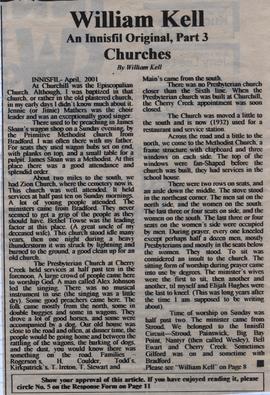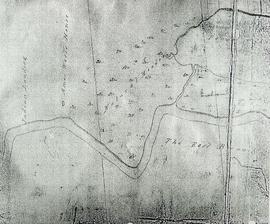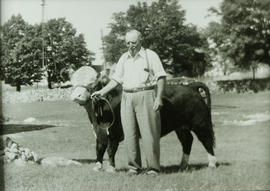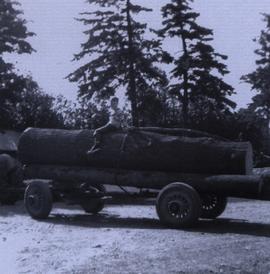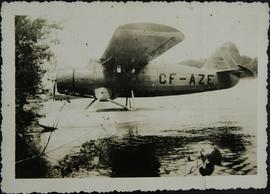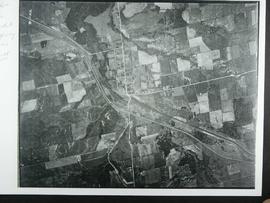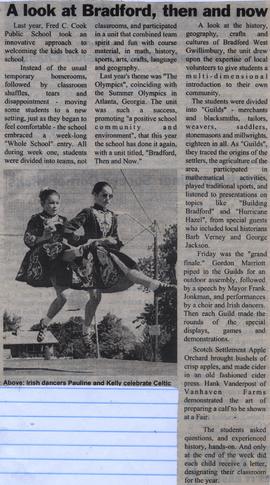Municipality :
Community : Bradford West Gwillimbury
Lot :
Concession :
Description : A Look At Bradford Over 100 Years Ago
Dear Sir:
This is a copy of a letter written during the 1860's by my grandfather, Philip Crowder, at Manchester, England to the Herald. I received a copy from an uncle, Albert Crowder, now at Bangor, Maine.
I thought it might be of interest to you.
Sincerely yours,
Philip. A. Crowder
Star Route
Deerwood, Minnesota
A Look Into History
Mr. Editor
Dear sir:
Wishing to try my hand at writing a small article for the Working People's Supplement to the Herald I thought I would write from memory, some account of the first village I settled in and of the life in the Inhabitants lead.
I emigrated to Canada nine years ago with my wife and two little ones, the oldest child not quite two years old, and arrived in the City of Churches, as it is by some called, but better know as Toronto; where I found to my surpirse, tram cars running on several of the main streets. I soon got work at my trade but it being slack time of the year for it and I being unaccustomed to their way of working, I earned but little money and so left the shop to work on a sewer which was being made in Yonge Street, where I worked 'til it was finished. I applied for work at their mill at Bradford, only forty miles "up the Northern Track", so I went home and got my dinner and a change of clothes and started at quarter to three from the "Northern Depot" for Bradford where I arrived just after six.
It was on this journey that I saw a little of what the country in Canada looks like. I had only been through old settled country before, with here and there a bit of "bush" left for firewood; but now I passed through some new cleared land with the fields full of stumps and log huts here and there, and through the Holland River swamp, (which is now cleared up), and then thought I had some idea of the back woods; how soon we think we have learned soemthing. Arrived at Bradford Depot, (station), I enquired my road to the mill, where I luckily found the clerk, who was busy that night, and he gave me an order for admission to the boarding house, where I had supper and was then shown my bed, there being three double beds in that room.
At the front of the house I found my fellow boarders, and part of my future mates, collected, some seated on benches, some playing quoits, some leaning against a fence dividing the yard from the railway; (the house being in the lumber yard, one line of lumber piles being within ten yards of the back of the house), and all indulging in rough jests. A good number of them, like myself emigrants - English, Irish, Scotch, with three of these I struck up aquaintance. One was a pit sawer from Banbury, another a Cornish youth, and the last a carpenter from Brighton. As dark came on we went to bed as our inclination led us. As half pat five we were called by a bell for breakfast, which consisted of the remains of salt pork boiled the day before for dinner, served with bread, fried potatoes followed by bread and butter and that by fat cakes and molasses with tea to drink. At five minutes to six the first whistle blew when all hands started for the mill to be in their places when the whistle blew at six. I was put at first in a gang of six or eight who were making a ditch to go between the river and cistern intended to suppply the boilers of a new mill they were building at a distance of about a furlong from the old one, the road and railroad lying between them. At half past eleven the whistle blew for dinner when I saw most of the hands that lived at the boarding house running as fast as they could for that most desirable place. I thought them a very greedy set of fellows until I arrived at the back of the house where I saw some of the last ones rubbing themelves with the towels and the row of unemployed wash-bowls ready for myself and the few elderly men that was (sic) staying there and so this tremendous rush was only to get the bowls with clean water ready in them without the trouble of pumping it. By the time I was ready the bell rang for dinner when all walked quietly into the dining room and took his place.
Dinner consisted of salt pork boiled with potatoes and some kind of garden vegetable when in season, followed by pies such as apple, pumpkin, and citeron (sic) and finish up with fat cakes and molasses and finished with a cup of tea. At half past twelve the whistle blew for work and at six to "quit", when we got our supper which consisted of bread and butter and preserved fruit and hot cakes and molasses. On Sundays we had a joint of fresh meat roasted, or rather baked, in the oven of the cook stove and sometimes someone or other of the luxuries usual in the homes of even the labourers of the county. It was here I saw green corn eat (sic) for the first time. I was highly amused at the sight but would not be tempted to try it. Perhaps some of my readers have seen a "cob" of corn or Indain corn in some corn dealers window. Well these are fathered when the grain is full not but begun to ripen, and boiled for twenty minutes, and served on the table, the diner takes hold of the stalk end with his fingers of one hand and spreads butter on the cob with a knife held in the other, he then takes hold of the other end of the cob instead of the knife and bites off the grain much the same as you may have seen some one pick a bone. It well repays you for any loss of dignity you may have sustaiend from the awkward looking position, at least I thought so the following summer when I was persuaded at the house of a friend to try just one cob and tried another without any persuading and so thought the Irishman who having arrived on Toronto in September thought he saw peas being eaten in a new way. After having devoured his corn asked the waiter to "Please to put some more pays on this stick."
After a few days I was fetched to work at the mill where there was about seventy men and boys working in about it. It is situated on one side of the Holland River in which the logs lie as they have been brought up the river by small steam tugs from Lake Simcoe. it is a large wooden building two stories high...

